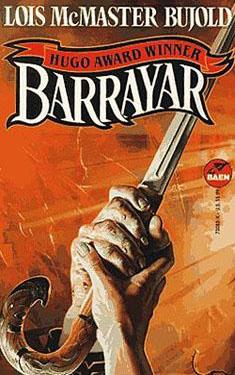1992
Barrayar
Lois
McMaster Bujold
Completed
9/22/2013, Reviewed 9/23/2013
Rating: 4
stars
 Cordelia
is a war hero from Beta Colony and pregnant.
She is married to Aral Vorkosigan, an admiral from Beta Colony’s former
enemy, Barrayar. The admiral becomes
regent for the child emperor, plunging the couple and their unborn child into
constant danger from coup and assassination attempts. Full of political intrigue, plot twists, and delicious
humor, Bujold delivers a fine example of what a great space opera should be.
Cordelia
is a war hero from Beta Colony and pregnant.
She is married to Aral Vorkosigan, an admiral from Beta Colony’s former
enemy, Barrayar. The admiral becomes
regent for the child emperor, plunging the couple and their unborn child into
constant danger from coup and assassination attempts. Full of political intrigue, plot twists, and delicious
humor, Bujold delivers a fine example of what a great space opera should be.
The
book is told in Cordelia’s voice. This
in itself is a great choice. Being a
woman and a Betan, she is an outsider to the male-dominated maelstrom that is
Barrayar politics. She brings a clear,
critical voice to the events into which she is thrust. She has a wry and wicked sense of humor which
you sometimes hear in her thoughts as well as in her conversations. In fact, most of the really dark comedy comes
from the retorts in her head. I think if
this story were told solely from a male Barrayaran perspective, it may not have
been nearly as interesting, clever, or exciting.
Barrayar
is one of approximately 18 books in the Vorkosigan saga. Initially, I was concerned that I hadn’t read
any of the previous novels, though I was aware there was only one earlier novel
directly related to Cordelia. Still,
there’s a part of me that has a hard time not reading all the preceding novels
in a series. In fact, I had to stare at
Wikipedia’s discussions of internal chronological order vs. publishing order to
convince myself I could read Barrayar before The Vor Game, Bujold’s previous
Hugo winner from the series.
Regardless
of the order, Barrayar stands as a great book on its own. I found the character development to be
nearly perfect. This is often one of my
big beefs in literature, and particularly in space operas. Too much development and not enough page
time, too many characters and not enough development, and so on. Instead, I found myself growing to like all
the characters, even the crazy and whiny ones.
My
one problem with the book, and I’m sure I’ll have this with the other books in
the saga, is the Vor prefix on the names of the upper class families. It’s a great concept, but, particularly with
secondary characters, it makes for a lot of potential confusion. Fortunately, I was able to sort out most of
them. And many of the supporting
characters are not Vor___, so that helped.
Another
problem I had was my own inner dialogue as I was deciding on the number of
stars to assign. I had to fight with my
own prejudices about soap operas. I had
to keep clear in my head that just because the story is told from the point of
view of a woman and deals with love, relationships, pregnancies, and children,
doesn’t mean this is a soap opera. Sure,
it’s a space opera. But it is also a
realistic commentary on the brutality of war and the futility of a society that’s
not much different than the one we live in today. It happens to be told from a woman’s
perspective, and that’s what helps it rise above pack. Once I cleared my own perceptions, I realized
I couldn’t give this anything less than 4 stars. Having read “Barrayar,” I look forward to
Bujold’s three other Hugo winners.
Thanks for visiting my blog, always fun to meet other SF fans. I really enjoyed this review. I too had that thought about the "Vor" prefix. I generally had to double check names often to make sure I knew exactly who was being referred to.
ReplyDeleteI mentioned in my Shards of Honor review, I think, something similar to what you wrote here about how much better this works having been written by a female author. I'm not sure I would be as accepting of some items had a male written it.
Very good review of a very good book.